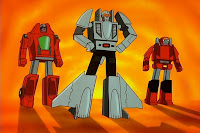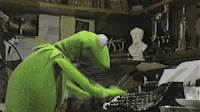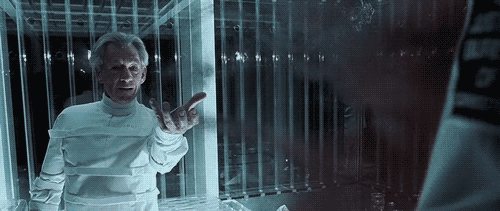Pop culture reference. Well, okay, ten-year-old pop culture reference.
This week I wanted to talk about… well, talking. Which I haven’t done in a while.
Dialogue’s the lifeblood of fiction. It’s how my characters move beyond the page and become living, breathing people. In any sort of storytelling, it’s going to be the key to making them memorable. In screenplays, it’s going to be what makes them quotable. Sounds corny, I know, but it’s true.
Bad dialogue is the fastest way to make sure characters are dead to my readers. It’s almost always the second element of my writing to get picked apart (
spelling will be the first). All of us know what people sound like, so when someone speaks in flat, clumsy, expositional dialogue, it makes them unbelievable. And when a reader can’t believe in my characters, it means they can’t believe in my story.
Here’s a dozen things I should be keeping an eye out for in my dialogue. Some of them are related. Others are unique to themselves
On The Nose—You may have heard people talk about dialogue that’s “
on the nose.” In simple terms, this is when a character says precisely what they mean or what they’re doing
without any subtlety whatsoever. Nine times out of ten, if someone’s talking to themselves out loud, it’s on the nose. I’d guess that at least half the time I stumble across it, on the nose dialogue is just exposition (see below).
A good way to think of this is old radio-shows, when people had no visuals at all and had to depend on doing everything with only dialogue. If my characters are speaking like that, I’m doing something wrong.
Grammatically Correct – Very few people speak in perfect, grammatically correct English, aside from a few freaks with inferiority complexes. Or Sherlock Holmes. Or robots. As for the rest of us, we all speak differing degrees of colloquial English. Our verbs don’t always line up with our nouns. Tenses don’t always match. Truth be told, a lot of “spoken” English looks awful on the page (see
transcribingdown below). This is where some folks choke, because they can’t reconcile the words on the page with the voice in their head. Which is how I end up with several characters, all of whom speak in a precisely regulated manner which seems highly affected and
does not flow by any definition of the term.
Lack of Contractions– Often found with the grammar issue I just mentioned. A lot of people start out writing this way because they’re trying to follow all the rules of spelling and punctuation so they don’t get branded a rookie, and ironically…
While this is a good practice for your prose, dialogue drags and sounds forced when every word is spelled out in full. As I said above, most of us use contractions in every day speech—scientists, politicians, teachers, and even military personnel. Without contractions, dialogue sounds stilted and wooden. If there’s a reason for someone to speak that way (ESL, robots, aliens, or what have you), then by all means do it. If my characters are regular, English-speaking mortals, though…
As a bonus, using contractions also drops your word count and page count.
Similarity– People are individuals, and we all have
our own unique way of speaking. People from California don’t talk like people from Maine (I’ve lived almost two decades in each state, I know), people living in poverty don’t talk like billionaires, and medieval idiots don’t speak like futuristic mega-geniuses.
In my writing, my characters need to be individuals as well, with their own tics and habits that make them distinct from the people around them. If a reader can’t tell who’s speaking without knowing the complete context or seeing the dialogue headers, I need to get back to work.
Extra descriptors—I just hinted at this, but it’s worth mentioning again.
Even if I’m using said with a character’s name, it can still wear thin. I don’t always need to use it, because after a point it should be apparent who’s talking.
Plus with less words, dialogue gets leaner and faster. Tension builds in the exchanges because the reader isn’t getting slowed down..
Not only that, once I’ve got speech patterns down for my characters, I should need descriptors even less. In my book,
Ex-Communication, Stealth’s dialogue could never get confused with Madelyn’s or Barry’s or Freedom’s. They’re all distinct, and their speech patterns identify them just as well as a header would.
 ExtraNames
ExtraNames—Let’s come down on names a little more. If I don’t need them around the dialogue, I need them even less
in the dialogue. Pay attention the next time you get on the phone with someone. How often do they use your name? How often do you use theirs? Heck, when my friends call my cell phone I know who it is before I even answer—and they know I know—so I usually just say “Hey, what’s up?” We don’t use our names, and we definitely don’t use them again and again in the same conversation.
Spoken names can also come across as a bit fake. It’s me acknowledging the audience may be having trouble keeping track, and throwing in a name is
the easiest way to deal with it, rather than the best way. Remember, if I’ve got two characters who’ve been introduced, it’s really rare that they’ll need to keep using each other’s names. Especially if they’re the only ones there.
Accents– This is a common mistake by beginning writers. I made it
a bunch of times while I was starting out, and still do now and then. Writing out accents and odd speech tics will drive readers and editors nuts. There are a handful of professional writers who can do truly amazing dialogue, yes, but keep that conditional in mind—
only a handful.
I show an accent by picking out one or two key words at most and making those the only words I show it with. If my character’s Jamaican, stick with “mah” instead of “my.” For the Cockney fellow, keep the dropped H when he speaks. Past that, just write straight dialogue. Just the bare minimum reminders that the character has an accent. Like most character traits, my readers will fill in the rest.
Transcription– One thing
years of interviews have taught me is that, with very few exceptions, people trip over themselves a lot verbally. We have false starts. We repeat phrases. We trail off. We make odd noises while we try to think of words. It’s very human. However, anyone who’s ever read a strict word-for-word transcription of a conversation will tell you it’s awkward, hard to follow, and a lot gets lost without the exact inflection of certain words.
One of the worst things I can do is try to write dialogue in such
an ultra-realisticmanner. It will drive my editor nuts and waste my word count on dozens of unnecessary lines. While this sort of rambling can work great in actual
spoken dialogue, when it’s written on the page it’s almost always horrible. I want to keep it simple so I don’t scare off readers.
Cool lines— D’you remember in The Incredibles when Syndrome reveals his master plan? “And when everybody’s super… no one will be.”
It’s an ugly truth–everything becomes mundane when there’s no baseline. If everyone on my basketball team is eight feet tall, who’s the tall guy? When everyone owns a Lamborghini, owning a Lamborghini doesn’t really mean anything. If anybody can hit a bull’s-eye at 100 yards out, hitting a bull’s-eye isn’t all that impressive.

The same holds
for dialogue. We all want to have a memorable line or three that sticks in the reader’s mind forever. The thing is, they’re memorable because they stand out. For every fun, quotable line in
Iron Man 3, there are also
pages of dialogue that just advanced the story. We all remember Tony mocking Rhodey about his friend’s new code name, but how much do we remember about Aldrich Killian’s business pitch about Extremis?
If I try to make
every line a cool line, or even most of them, I’m shooting myself in the foot because none of them are going to stand out. When everything’s turned up to eleven, it’s
all at eleven–
it’s monotone.
Exposition—Remember being a kid in school and being bored by textbook lectures or filmstrips that talked to you like you were an idiot? That’s what exposition is like to readers.
I should use something like
the Ignorant Stranger method as a guideline and figure out how much of my dialogue is crossing that line. If any character ever gives an explanation of something that the other characters in the room already should know (see below) or my
readershould know, I need to cut that line. If it’s filled with necessary facts, find a better way to get them across.
Monologues—This one’s closely related to exposition. A good monologue can be a major point in any story or film. By the same token, though, a bad one can bring your story to a screeching halt.
Is my monologue necessary? Does it read naturally? Is it flowing? Does it fit the moment? If I’m breaking one of these guidelines and doing it with a 750 word monologue, my manuscript is going to end up in the ever-growing left hand pile.
Second clue if it’s bad is to count how many monologues there’ve already been. Yes, that may sound laughable, but you’d be amazed at some of the things I’ve seen. One script
I read for a screenwriting contest had half-page dialogue blocks on almost every page. If I’m on page forty-five and this is my seventh full-page monologue… odds are something needs to be reworked.
“As you know…” – If you take nothing else from today’s rant, take this. I need to find every sentence or paragraph in my writing that starts with this phrase or one of it’s halfbreed cousins.
Once I’ve found them, I need to delete them all. Gone. Destroyed.
Think about it. If I’m saying “As you know,” I’m openly acknowledging that the people I’m talking to know what I’m about to say. I’m wasting time, I’m wasting space on the page, and I’m wasting my reader’s patience. This is probably the clumsiest way
to do exposition there is. If I’ve got a rock-solid, lean-and-mean manuscript, I might be able to get away with doing this once. Just once. As long as I don’t do it my first ten pages or so. Past that, I need to get out my editorial knife and
start cutting.
And here’s a bonus tip. One idea you may have heard is to read your dialogue out loud to find where it trips. It’s not bad, but if I really want to find out how it reads, I should ask someone else to read it out loud—preferably somebody who hasn’t seen it before or heard me talk about it. If I’m reading it myself, I know how it’s supposed to sound, where the breaks should be, and what gets the emphasis. Let a friend or family member who doesn’t know it read it out loud and see what they do with it.
And there you have it. A baker’s dozen of dialogue tips which should help your fictional dialogue seem a little more real. Fictional-real, anyway. Not real-real.
Next week…
I’m going to have to skip next week, I’m afraid. Rewrites are due on
Ex-Isle so odds are I’ll be up late second-guessing myself. I may put up one of the photo tips.
After that, I’m open to suggestions, if anyone has any. Or if anyone made some good ones I’ve misplaced. If not, maybe I’ll offer a quick idea about drafts.
Until then, go write.
 I’ve got to be honest. When I was a kid, Go-Bots baffled me. More to the point, people who liked Go-Bots baffled me. I mean, seriously. Why would anyone play with Go-Bots when there were perfectly good Transformers to be had? Go-Bots kind of sucked. No, not kind of. They were dumb and clunky and their robot-to-vehicle change usually amounted to standing them up. They had a lousy cartoon with a lousy theme song.
I’ve got to be honest. When I was a kid, Go-Bots baffled me. More to the point, people who liked Go-Bots baffled me. I mean, seriously. Why would anyone play with Go-Bots when there were perfectly good Transformers to be had? Go-Bots kind of sucked. No, not kind of. They were dumb and clunky and their robot-to-vehicle change usually amounted to standing them up. They had a lousy cartoon with a lousy theme song. One of the main characters of my Ex-Heroes series is a black, bisexual woman. I work like hell to make sure she sounds as real as possible, despite the fact that I am not one of these things myself. It’s important to me. And I worry constantly that I’ll have her do or say something that will offend somebody. But I don’t want to be the straight, progressive white guy who only writes about other straight, progressive white guys and makes everyone else a secondary character at best.
One of the main characters of my Ex-Heroes series is a black, bisexual woman. I work like hell to make sure she sounds as real as possible, despite the fact that I am not one of these things myself. It’s important to me. And I worry constantly that I’ll have her do or say something that will offend somebody. But I don’t want to be the straight, progressive white guy who only writes about other straight, progressive white guys and makes everyone else a secondary character at best.








